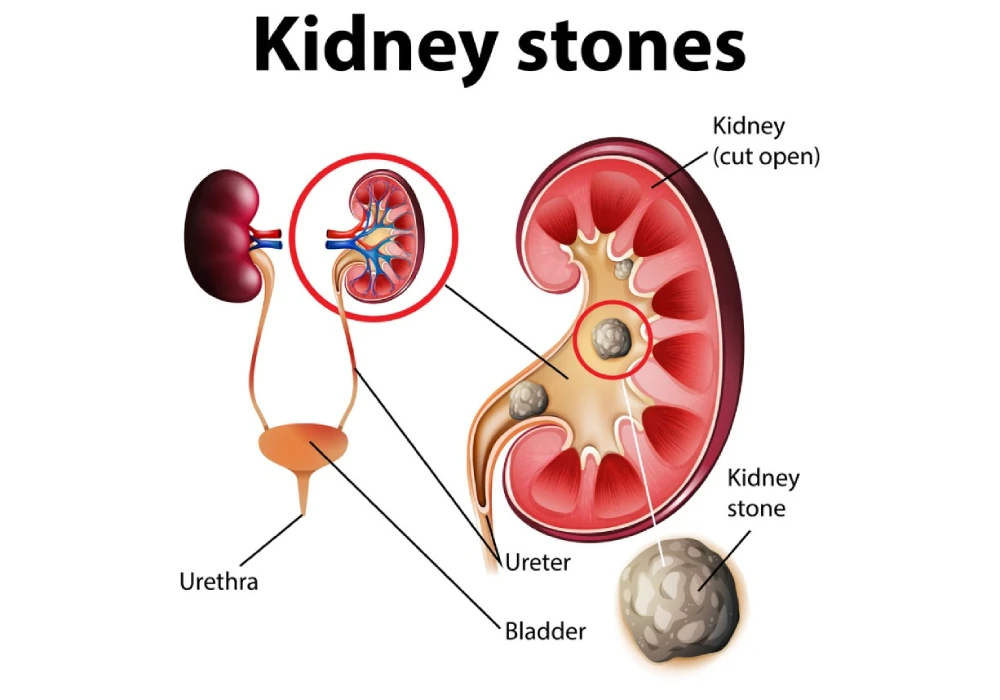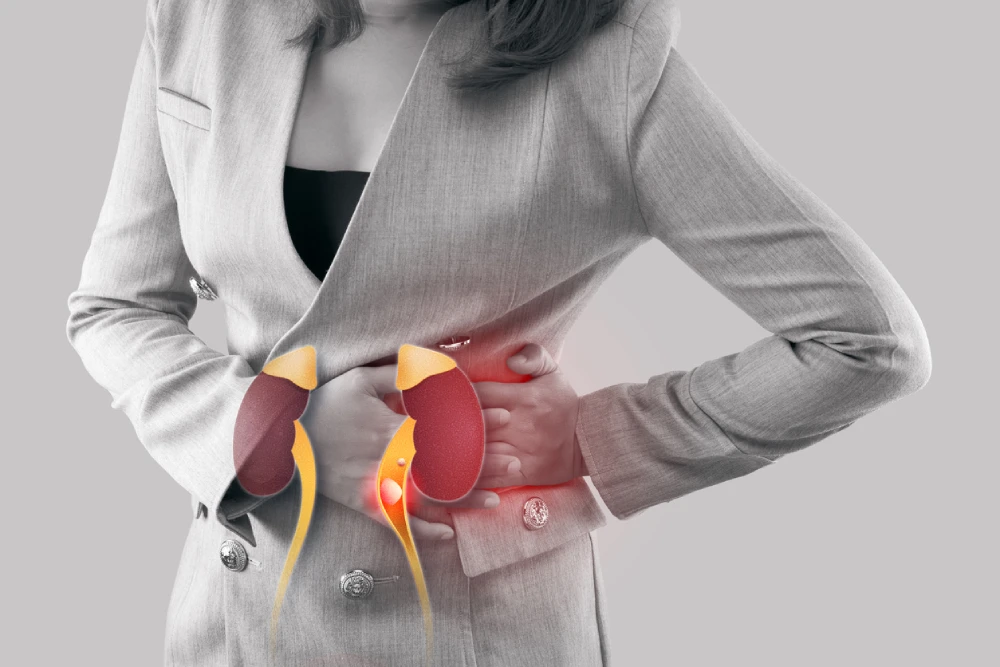Many people don’t realize they have kidney stones until the pain becomes unbearable. These tiny, hardened mineral deposits can cause significant discomfort and lead to complications if left untreated.
Understanding the early signs and risk factors of kidney stones can help you take proactive steps toward prevention and treatment.
In this article, we’ll explore kidney stone symptoms, causes, and best strategies to manage and prevent them effectively.
Understanding Kidney Stones
Kidney stones, or renal calculi, are solid masses made up of crystals that form in the kidneys. These stones develop when the balance of substances in urine—such as calcium, oxalate, and phosphorus—is disrupted.
Normally, the kidneys filter waste from the blood and produce urine to eliminate these substances. However, when urine is too concentrated, minerals and salts can crystallize.
How Kidney Stones Form
The formation of kidney stones begins with the supersaturation of minerals in the urine. This occurs when there is an insufficient amount of fluid to dilute these substances, leading to crystal aggregation.
Over time, these crystals bond together, with the Canadian Urological Association explaining that it can take many months or even years of growth for symptoms to develop, which typically begin occurring when the stones become large enough to obstruct drainage from the kidney.
Several factors contribute to kidney stone formation, including dehydration, dietary habits, and genetic predisposition.

Types of Kidney Stones
Kidney stones are categorized based on their composition. The most common types include:
- Calcium Stones: According to Mayo Clinic, these account for approximately 70-80% of kidney stones and are typically composed of calcium oxalate or calcium phosphate. High oxalate foods (e.g., spinach, nuts, and chocolate) can contribute to their formation.
- Struvite Stones: These develop as a result of urinary tract infections and are composed of magnesium, ammonium, and phosphate.
- Uric Acid Stones: Often associated with diets high in purines (found in red meat and shellfish), these stones are more common in individuals with gout or high uric acid levels.
- Cystine Stones: A rare type of kidney stone, these are caused by a genetic disorder known as cystinuria, which leads to excessive cystine excretion in urine.
Kidney Stones Symptoms – Primary & Secondary
Kidney stones can cause a range of symptoms, from mild discomfort to severe pain that requires immediate medical attention.
Recognizing kidney stone symptoms early can help individuals seek appropriate treatment and prevent complications.
Below, we discuss the primary and secondary symptoms of kidney stones to help you better understand what to look for.
Primary (Common) Symptoms
Kidney stones often cause significant discomfort, and their symptoms can be intense. The most common signs include:
- Severe Pain: Known as renal colic, the pain can be excruciating and is often felt in the lower back, side, or lower abdomen. It may come in waves and vary in intensity.
- Blood in Urine (Hematuria): Urine may appear pink, red, or brown due to irritation and damage caused by the stone moving through the urinary tract.
- Nausea and Vomiting: The severe pain can trigger nausea and vomiting, further exacerbating dehydration.
Secondary (Less Common) Symptoms
While some symptoms are less frequent, they can still indicate the presence of kidney stones:
- Frequent or Painful Urination: The irritation caused by the stone can lead to increased urgency or discomfort when urinating.
- Fever and Chills: If an infection develops, fever and chills may accompany other symptoms, necessitating urgent medical attention.
- Difficulty Passing Urine: A larger stone can obstruct the ureter, leading to difficulty urinating or a reduced flow of urine.
Kidney Stones Causes and Risk Factors
Understanding what leads to kidney stone formation is key to both prevention and effective treatment.
A combination of dietary habits, genetics, and lifestyle factors all play a role in increasing the risk of developing these painful stones.
By identifying and addressing these risk factors, individuals can take proactive steps to protect their kidney health.
Diet and Hydration
A poor diet plays a significant role in kidney stone formation. Consuming excessive amounts of sodium, protein, and oxalate-rich foods (such as spinach, nuts, and chocolate) increases the likelihood of stones developing.
High sodium levels encourage calcium buildup in urine, while excessive protein contributes to higher uric acid production, leading to uric acid stones.
Hydration is the single most important preventive measure. Drinking at least 2-3 litres of water daily helps dilute urine and flush out excess minerals before they crystallize into stones.
Genetic and Medical Predispositions
A family history of kidney stones significantly increases the risk of developing them. In fact, the VGH & UBC Hospital Foundation states that if you have one or more relatives who previously had kidney stones, you may be 2.5 times more likely to develop them yourself.
Furthermore, certain medical conditions, such as hyperparathyroidism, inflammatory bowel diseases such as Crohn’s disease or ulcerative colitis, and recurrent urinary tract infections, also contribute to stone formation.
Additionally, HealthLinkBC states medical conditions like gout can also increase a person’s likelihood of developing kidney stones.
Lifestyle and Environmental Factors
Modern sedentary lifestyles and dietary habits contribute to an increased risk of kidney stones. Obesity and physical inactivity are linked to metabolic changes that encourage stone development.
Additionally, people living in hotter climates or working in high-temperature environments are more likely to develop kidney stones due to excessive sweating, which leads to dehydration and concentrated urine.
Furthermore, a high-stress lifestyle can also impact dietary choices, leading to excessive consumption of processed foods that promote stone formation.
Specific Vulnerable Groups
While kidney stones can affect anyone, The Kidney Foundation of Canada states that men are at higher risk with an estimated 12% of men developing a kidney stone at some point in their life, as opposed to 6% of women.
However, while men are typically diagnosed between the ages of 40 and 60, women more commonly develop them between the ages of 25 and 30.
Individuals undergoing long-term diuretic or calcium-based medication treatments are also prone to developing stones.
Additionally, individuals who have undergone bariatric surgery or suffer from chronic dehydration due to medical conditions like diabetes or kidney disease should take extra precautions to minimize their risk.

Kidney Stones Diagnosis and Testing
Diagnosing kidney stones accurately is crucial for effective treatment. Symptoms alone are not always enough to confirm the presence of stones, as they can mimic other urinary tract conditions.
Medical professionals use a combination of imaging tests, urinalysis, and blood tests to determine the size, type, and location of the stones, helping to guide appropriate management strategies.
- Imaging Tests: Ultrasound and CT scans are the most reliable methods for detecting kidney stones, as well as their size, and location.
- Urinalysis and Blood Tests: These tests help determine the composition of the stone and identify any underlying conditions contributing to its formation.
Seek medical attention if you experience severe pain, blood in the urine, persistent nausea, fever, or difficulty urinating. Prompt diagnosis can prevent complications and guide appropriate treatment.
Kidney Stones Treatment Options
Once diagnosed, kidney stone treatment depends on the size, type, and severity of symptoms.
Small stones often pass on their own with proper hydration and pain management, while larger stones may require medical intervention.
Understanding the available treatment options can help individuals make informed decisions about their kidney health.
Pain Management & Medication
Managing pain is a critical aspect of kidney stone treatment, as passing a stone can be extremely uncomfortable.
- Nonsteroidal anti-inflammatory drugs (NSAIDs) such as naproxen and ibuprofen are commonly recommended to help reduce pain and inflammation. In cases where discomfort is severe, stronger pain medications may be prescribed.
- Over-the-counter (OTC) pain medications such as acetaminophen are also commonly recommended to help reduce discomfort.
- Additionally, alpha-blockers, such as Tamsulosin, may be used to relax the muscles in the opening of the bladder, making it easier for stones to pass naturally.
By combining proper pain management with hydration, many kidney stones can be passed without the need for surgical intervention.
Non-Surgical Treatments
Non-surgical treatments for kidney stones offer effective ways to manage and remove stones without the need for invasive procedures.
- Extracorporeal Shock Wave Lithotripsy (ESWL) is a common approach that uses high-energy sound waves to break stones into smaller fragments, allowing them to pass naturally through the urinary system.
- Alternatively, ureteroscopy, involves inserting a thin, flexible scope into the ureter to locate and either remove the stone or break it into smaller pieces using laser technology.
These treatments are particularly beneficial for medium-sized stones that are too large to pass on their own but do not require surgical intervention.
Surgical Interventions
Percutaneous Nephrolithotomy (PCNL) is a minimally invasive surgical procedure used for kidney stones that are too large to pass naturally or cannot be effectively treated with non-surgical methods.
This procedure involves making a small incision in the back to access the kidney directly, where a nephroscope is inserted to break up and remove the stone.
Alternative & Complementary Therapies
In addition to conventional treatments, some individuals explore alternative and complementary therapies to support kidney health and reduce the risk of stone formation.
Some herbal remedies and dietary supplements may support kidney health, but it’s essential to consult a healthcare provider before use.
Kidney Stones Prevention Strategies
Preventing kidney stones is often easier than treating them, and small lifestyle changes can significantly reduce the risk of recurrence.
A well-balanced diet, proper hydration, and regular check-ups play a crucial role in maintaining kidney health. Below, we explore the most effective strategies for preventing kidney stones and supporting long-term wellness.
Hydration and Dietary Adjustments
- Drink at least 2-3 litres of water daily to maintain diluted urine.
- Limit sodium, animal protein, and oxalate-rich foods while increasing citrus intake (lemon, oranges) to prevent stone formation.
Lifestyle Modifications
- Regular exercise helps maintain a healthy weight and supports overall kidney function.
- Managing body weight reduces metabolic risks associated with stone formation.
Supplementation & Medication
Calcium and citrate supplements, as well as diuretic medications such as Hydrochlorothiazide, can help prevent recurrent stones in high-risk individuals.
Monitoring and Regular Check-Ups
Routine check-ups with healthcare providers ensure early detection and management of potential risks.

Managing Kidney Stones Recurrence and Long-Term Care
While successfully treating a kidney stone brings relief, preventing future occurrences is just as important.
Without proactive measures, many individuals experience recurring stones, leading to ongoing discomfort and potential complications.
By adopting a comprehensive long-term care plan, patients can significantly reduce their risk of recurrence and maintain optimal kidney health.
- Follow-Up Care: Regular monitoring helps prevent recurrence. Physicians may recommend periodic imaging and urine tests.
- Strategies to Prevent Recurrence: Lifestyle and dietary changes, along with prescribed medications, are essential in reducing the risk of future stones.
- Role of Local Healthcare Providers: Pharmacists can provide tailored advice on kidney stone prevention, medication management, and dietary recommendations.
Diagnosed With Kidney Stones? Talk To Your PharmaChoice Pharmacist For Expert Support
Recognizing kidney stone symptoms early can prevent complications. By understanding risk factors and adopting preventive measures, individuals can significantly reduce their chances of developing kidney stones.
If you’re experiencing symptoms or need guidance on kidney health, visit your local PharmaChoice pharmacy today for expert advice and personalized care.



